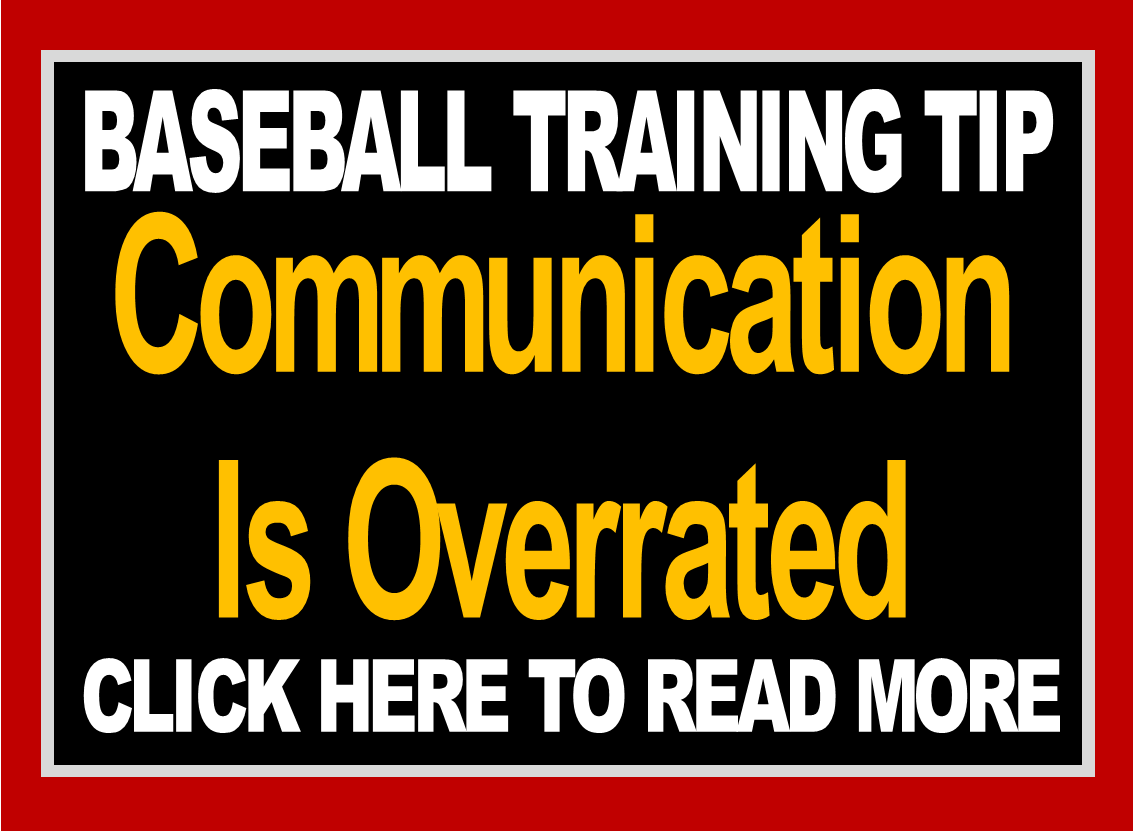
18 Oct Communication Is Overrated
For anyone who has ever seen me coach, the title of this post may seem more than a little hypocritical. That’s because I never shut up once the game starts. I don’t think I’m alone when it comes to coaches who are working with young players. At the younger levels there is a constant need to remind players of things during the course of the game. Watch me coach and these are just some of the things that I will say over and over throughout the game.
**To the pitcher with a runner on first – “ball hit back to you, know who you got.” With a lefty up – “get over on a ground ball.”
**To the infielders – “Make sure of one“, “back up throws to the pitcher,” “keep the ball in front,” with two outs and a runner on second base – “got to be diving.”
**To outfielders, “come up throwing” and “throw it through the cut-off man.”
There is nothing wrong with giving these reminders throughout the game. I encourage my players to communicate this way as well. When I say “communication is overrated,” I am referring to several plays where communication is totally unnecessary. It can even be problematic. Here are some examples.
With a runner on first, the catcher yells out to his middle infielders and wants to know who is covering second on the steal. There is no need for the catcher to know this information. The catcher’s job is to come up and throw a strike to second base no matter who is there. There’s no need for him to know who is covering. If the shortstop says “I got it” then the other team now knows where to hit the ball.
On a 3-6-3 double play you will often hear either the first baseman or the shortstop yell “inside” or “outside” to let the thrower or receiver know where the ball is going to be. This is also unnecessary. It’s pretty simple, if the first baseman fields the ball on the infield side of the baseline he throws to the inside part of second base where the shortstop needs to be positioned. If the first baseman fields the ball on the outfield side of the baseline then he throws to the outfield side of second base where the shortstop needs to be positioned. There is no need to yell anything. All players involved simply need to know where to throw the ball or where to be. There is no need to say anything. This is also the case when catchers throw to first base on bunts and dropped third strikes. If the throw comes from fair territory, the first baseman sets up in fair territory. If the catcher throws from foul territory, the first baseman sets up in foul territory. No “inside” or “outside” needs to be said.
When 1st and 3rd basemen become cut-off men on throws from the outfield, there is no need for the catcher to yell “left” or “right” to line up the fielder. Cut-off men should correctly do that themselves. They also can see for themselves if a throw is off-line or not going to carry to home plate as well. There is no need for the catcher to say “cut home.” If the cut-off man see that the throw is off-line or not going to reach home, he cuts it regardless of what a catcher says.
With no one on base and a ball hit in the gap, a base runner does not need to hear from the third base coach as to whether or not to continue to third base. When the runner rounds first base he can see where the ball is and should be able to determine for himself whether he can make it to third base. Watch a major league batter hit a triple and you will almost never see him pick up the 3rd base coach for help. The only exception is when there are runners ahead of him on base.
During a rundown, a player receiving a throw from a teammate yells “Now!” when he wants the ball. Totally unnecessary. The player with the ball should need no help in determining when to throw it. He can see all the variables right in front of him.
A critic might say “there is no harm in saying all this so why not encourage them to do so. The more communication the better, right?” In many cases, I would agree. However, in the cases explained above and some others as well, communication of this kind can cause players to rely too much on what other people say instead of improving their own instincts and awareness of what’s going on around them. Besides, an excited crowd may cause players not to hear things at all because of their cheering. They won’t always hear it so they shouldn’t rely on it. Players can also use all this as an excuse for their mistakes. “Nobody said anything” or “He said it too late” deflects responsibility to others and prevents the player from growing their own awareness.
There are many things that players just need to know – like where to be and where to throw – without being told during a play. The game happens too quick for many of these in-play communications to be relied on anyway.
Watch the game and think for yourself.




